Fleurs du Mal Magazine


Or see the index
 De Parelduiker pakt het thema van de Boekenweek op en stelt de vraag: hoezo natuur?
De Parelduiker pakt het thema van de Boekenweek op en stelt de vraag: hoezo natuur?
In dit themanummer naar aanleiding van de Boekenweek vier verhalen over schrijvers en kunstenaars die ieder een ‘andere’ kant van de natuur leerden kennen.
Joris van Casteren volgde de voetsporen van Gerard Bilders (1838-1865). In het vieze Amsterdam ging deze jonge schrijver en landschapsschilder op tragische wijze ten onder. Tot op zijn sterfbed, in een benauwd pand aan een stinkende gracht, hunkerde hij naar de natuur en het buitenleven.
Madelon de Keizer schrijft over Albert Verwey. Anders dan diens vriend Willem Kloos, die het bij de stad en zijn verlokkingen hield, koos Verwey na zijn huwelijk met Kitty van Vloten voor een leven dichter bij de natuur en stichtte met haar een gezin in een huis op een duin te Noordwijk. Zij zetten zich in voor het herstel van de band tussen mens en natuur, die door de verstedelijking teloor dreigde te gaan.
 Nescio bezong, zo schrijft biografe Lieneke Frerichs, onbezorgd de schoonheid van zomerse glooiende korenvelden, terwijl hij met zijn dochters door Noord-Frankrijk fietste.
Nescio bezong, zo schrijft biografe Lieneke Frerichs, onbezorgd de schoonheid van zomerse glooiende korenvelden, terwijl hij met zijn dochters door Noord-Frankrijk fietste.
Willem van Toorn ten slotte zette zich op initiatief van kunstschilder Willem den Ouden in voor zorgvuldige, vernuftiger dijkverbeteringen die het Nederlandse rivierenlandschap zoveel mogelijk zouden sparen, aldus Marco Daane. Hij laat zien dat Van Toorns betrokkenheid hierbij ook sporen heeft achtergelaten in zijn literaire werk.
In memoriam Jaap Harten en Menno Wigman.
De Parelduiker is een uitgave van Uitgeverij Bas Lubberhuizen – Johannes Vermeerstraat 63 – 1071 DN Amsterdam – Postbus 15511 – 1001 NA Amsterdam – T 020 5706 100
# Voor meer informatie zie de website van de parelduiker
boekenweek 2018
fleursdumal.nl magazine
More in: Art & Literature News, Boekenweek, LITERARY MAGAZINES, Natural history, Wigman, Menno, Willem van Toorn
`Ik wil geen blauwe broek’, roept Mels. `Ik wil een bruine, net als Tijger. En een rood hemd. Of geel. Of groen.’ `Je krijgt alleen blauw’, zegt zijn moeder kortaf. `Je bent toegewijd aan Maria.’
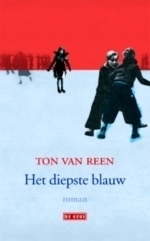 Hij weet het. Hij heet Emilius Maria. Hij schaamt er zich een beetje voor dat hij een Mariakind is. Het is iets voor meisjes. Voor anderen probeert hij het geheim te houden. Of hij liegt erover. Emilius Michael, zegt hij als anderen naar zijn doopnamen vragen, maar ze twijfelen natuurlijk wel. Iedereen weet dat wie altijd in het blauw loopt, een Mariakind is.
Hij weet het. Hij heet Emilius Maria. Hij schaamt er zich een beetje voor dat hij een Mariakind is. Het is iets voor meisjes. Voor anderen probeert hij het geheim te houden. Of hij liegt erover. Emilius Michael, zegt hij als anderen naar zijn doopnamen vragen, maar ze twijfelen natuurlijk wel. Iedereen weet dat wie altijd in het blauw loopt, een Mariakind is.
`Paars mag ook’, zegt hij. `Of wit of zwart. Ik wil wat anders.’ Om dat eeuwige blauw heeft hij niet gevraagd.
`Het kan niet’, zegt zijn moeder. `Het is een belofte. Ik heb het Maria beloofd toen ik je onder mijn hart droeg. Een paar keer ging het bijna mis. Dat het leek of je te vroeg werd geboren. Ik was bang dat je een achterblijver zou worden. Toen heb ik die belofte gedaan.’
`Ik begrijp het’, zegt hij. Nu weet hij opeens waarom Tijger altijd van hem wint. Er is iets met hem. Hij is niet helemaal goed. Het komt door zijn moeder. Nog steeds is ze vaak ziek.
Tijger komt binnen. Hij ziet zijn teleurgestelde gezicht. Hij weet niet waarom, maar toch legt hij troostend een arm om Mels’ schouders.
`Het is vreselijk’, zegt Mels. `Ik zal nooit van je kunnen winnen. Toen ik werd geboren, was ik bijna dood.’
Tijger schrikt.
`Dan had ik je nooit gekend!’
`Ik weet het’, zegt Mels. `Jij bent mijn vriend.’
Zijn moeder kijkt hem verwijtend aan.
`Zo erg was het ook weer niet’, zegt ze, hoewel het als een verdediging klinkt. `Je was een beetje blauw, maar je woog zeven pond. Ik was er trots op dat ik, zo mager als ik altijd was, een baby van zeven pond op de wereld had gezet. Je mankeert niks.’
Ton van Reen: Het diepste blauw (027)
wordt vervolgd
fleursdumal.nl magazine
More in: - Book Stories, - Het diepste blauw, Archive Q-R, Reen, Ton van
Sie gilt als Künstlerin des sozialen Elends und der schmerzlichen Tragik des Krieges – Käthe Kollwitz.
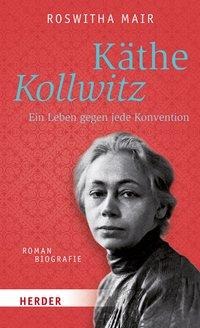 Fröhlich, unkonventionell, sinnlich, neugierig – all das ist sie Zeit ihres Lebens. Immer wieder bricht Kollwitz mit gängigen Konventionen. So reist die Mutter von zwei Kindern etwa 1904 alleine nach Paris – eigentlich undenkbar zu dieser Zeit -, um die Kunst des plastischen Gestaltens zu lernen. Dort trifft sie u.a. auf Rodin.
Fröhlich, unkonventionell, sinnlich, neugierig – all das ist sie Zeit ihres Lebens. Immer wieder bricht Kollwitz mit gängigen Konventionen. So reist die Mutter von zwei Kindern etwa 1904 alleine nach Paris – eigentlich undenkbar zu dieser Zeit -, um die Kunst des plastischen Gestaltens zu lernen. Dort trifft sie u.a. auf Rodin.
Als zu Beginn des Ersten Weltkrieges ihr Sohn ums Leben kommt, beherrscht dieses Trauma über viele Jahre ihr Leben wie auch ihre Kunst.1919 wird sie als erste Frau Professorin an der Preußischen Akademie der Künste, bis nach Hitlers Machtergreifung ein dunkler Schatten über das Land zieht und sich auch auf ihr Leben legt.
Eine tiefgründige Romanbiografie, die das außergewöhnliche Leben dieser beeindruckenden Künstlerin facettenreich einfängt.
Roswitha Mair, Dr. phil., ist Kunsthistorikerin und lebt in Innsbruck. Zahlreiche Veröffentlichungen und Beiträge zur Kunst des 20. Jahrhunderts sowie Organisation und Konzeption von Kunstausstellungen.
Roswitha Mair :
Käthe Kollwitz.
Ein Leben gegen jede Konvention.
Romanbiografie
‘Herder Spektrum Taschenbücher’
Herder Verlag GmbH
Juni 2017
231 Seiten
Kartoniert – Broschiert
Sprache: Deutsch
€16,00
EAN: 9783451069734
ISBN: 3451069733
new books
fleursdumal.nl magazine
More in: - Book News, Archive K-L, Archive M-N, Art & Literature News, Galerie Deutschland, Käthe Kollwitz, Sculpture, WAR & PEACE
The brilliant new novel from the Man Booker Prize-winning author of The Sense of an Ending. Would you rather love the more, and suffer the more; or love the less, and suffer the less? That is, I think, finally, the only real question.
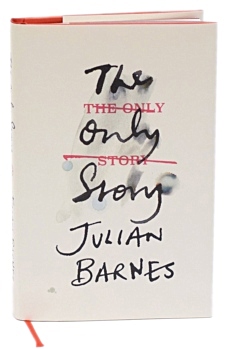 First love has lifelong consequences, but Paul doesn’t know anything about that at nineteen. At nineteen, he’s proud of the fact his relationship flies in the face of social convention.
First love has lifelong consequences, but Paul doesn’t know anything about that at nineteen. At nineteen, he’s proud of the fact his relationship flies in the face of social convention.
As he grows older, the demands placed on Paul by love become far greater than he could possibly have foreseen.
Tender and profound, The Only Story is an achingly beautiful novel by one of fiction’s greatest mappers of the human heart.
Julian Barnes is the author of twelve novels, including The Sense of an Ending, which won the 2011 Man Booker Prize for Fiction. He has also written three books of short stories, four collections of essays and two books of non-fiction, Nothing to be Frightened Of and the Sunday Times number one bestseller Levels of Life. In 2017 he was awarded the Légion d’honneur.
“Most of my friends were far-flung, and –
by some unexpressed but clear parental mandate –
use of the telephone was discouraged.
A letter, and then a letter in reply.
It was all slow-paced, and lonely.”
from: The Only Story
Julian Barnes is the author of twelve novels, includingThe Sense of an Ending, which won the 2011 Man Booker Prize for Fiction. He has also written three books of short stories, Cross Channel, The Lemon Table and Pulse; four collections of essays; and two books of non-fiction, Nothing to be Frightened Of and the Sunday Times Number One bestseller Levels of Life. He lives in London.
“A novel that quietly sinks its hooks into the reader and refuses to let go.” – The Times
Julian Barnes
The Only Story
Novel
Hardback, £16.99
224 pages
Publisher: Vintage Publishing
01 February 2018
ISBN: 9781787330696
new books
fleursdumal.nl magazine
More in: - Book News, Archive A-B, Art & Literature News, Julian Barnes
In this riveting, heartfelt debut, a young woman assumes a new name to escape her dark past and find the redemption she desperately seeks.
“A terrific debut, told gently, honestly, and with a generous amount of hope.”—New York Times bestselling author Jamie Ford
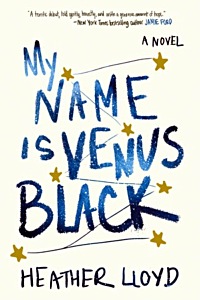 Venus Black is a straitlaced A student fascinated by the study of astronomy—until the night she commits a shocking crime that tears her family apart and ignites a media firestorm. Venus refuses to talk about what happened or why, except to blame her mother. Adding to the mystery, Venus’s developmentally challenged younger brother, Leo, goes missing.
Venus Black is a straitlaced A student fascinated by the study of astronomy—until the night she commits a shocking crime that tears her family apart and ignites a media firestorm. Venus refuses to talk about what happened or why, except to blame her mother. Adding to the mystery, Venus’s developmentally challenged younger brother, Leo, goes missing.
More than five years later, Venus is released from prison with a suitcase of used clothes, a fake identity, and a determination to escape her painful past. Estranged from her mother, and with her beloved brother still missing, she sets out to make a fresh start in Seattle, skittish and alone. But as new people enter her orbit—including a romantic interest and a young girl who seems like a mirror image of her former lost self—old wounds resurface, and Venus realizes that she can’t find a future while she’s running from her past.
In this gripping story, debut novelist Heather Lloyd brilliantly captures ordinary lives thrust into extraordinary circumstances. Told through a constellation of captivating voices, My Name Is Venus Black explores the fluidity of right and wrong, the pain of betrayal, and the meaning of love and family.
Heather Lloyd, who has spent many years working as an editor and writing coach, lives with her husband in New York City. My Name Is Venus Black is her first novel.
My Name Is Venus Black
A Novel
By Heather Lloyd
Category: Crime Mysteries
Hardcover : $27.00
Publ.: Feb 27, 2018
368 Pages
ISBN 9780399592188
Publ. by The Dial Press
new books
fleursdumal.nl magazine
More in: - Book News, Archive K-L, Art & Literature News, BIOGRAPHY, CRIME & PUNISHMENT, Tales of Mystery & Imagination

Glam Jail is a Franco-Brazilian tale by photographer Pol Kurucz about 11 eccentric inmates transforming a prison visitor’s booth into a colorful fashion haven.
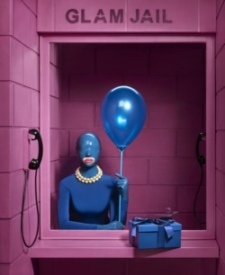 Through visual allegories and pop aesthetics the photographer challenges social and racial norms symbolized by the carceral universe. The shootings took place in the Offen Studio in Sao Paulo in August 2017. The series features local models, celebrities and dresses exclusively from local fashion brands.
Through visual allegories and pop aesthetics the photographer challenges social and racial norms symbolized by the carceral universe. The shootings took place in the Offen Studio in Sao Paulo in August 2017. The series features local models, celebrities and dresses exclusively from local fashion brands.
Pol Kurucz was born with two different names to a French mother in a Hungarian hospital. His childhood hyperactivity was treated with theater, and theater was later treated with finance. By 27 he was a CEO by day and a stage director by night.
 He then went on consecutive journeys to Bahrain and Brazil, to corporate islands and favelas. He has sailed on the shores of the adult industry and of militant feminism and launched a mainstream moneymaking restaurant loss making in its absurdity.
He then went on consecutive journeys to Bahrain and Brazil, to corporate islands and favelas. He has sailed on the shores of the adult industry and of militant feminism and launched a mainstream moneymaking restaurant loss making in its absurdity.
Pol was reborn in 2015 and merged his two names and his contradictory lives into one where absurdity makes sense. Today he works on eccentric fashion and fine art projects from his Sao Paulo studio.
His photos have been featured in over a hundred publications including: Vogue, ELLE, Glamour, The Guardian (Arts), Adobe Create, Hunger TV, Sleek and Nylon.
Credits
Photography and Art Direction: Pol Kurucz
Styling: Carolyna Mello
Set design: Nina Simao
Lighting and Tech.: Guilherme Griebler
Assistants: Lara Ferro, Mary Cruz, Claus Pinheiros, Monica Rodrigues
# Look for more photos & information on website pol kurucz
Glam Jail: a Franco-Brazilian tale by Pol Kurucz
fleursdumal.nl magazine
More in: AUDIO, CINEMA, RADIO & TV, Exhibition Archive, Magazines, Photography, Pol Kurucz, THEATRE
In the language of fan fiction, a ‘Mary Sue’ is an idealised and implausibly flawless character: a female archetype that can infuriate audiences for its perceived narcissism.
 Such is the setting for this brilliant and important debut by Sophie Collins. In a series of verse and prose collages, Who Is Mary Sue? exposes the presumptive politics behind writing and readership: the idea that men invent while women reflect; that a man writes of the world outside while a woman will turn to the interior.
Such is the setting for this brilliant and important debut by Sophie Collins. In a series of verse and prose collages, Who Is Mary Sue? exposes the presumptive politics behind writing and readership: the idea that men invent while women reflect; that a man writes of the world outside while a woman will turn to the interior.
Part poetry and part reportage, at once playful and sincere, these fictive-factive miniatures deploy original writing and extant quotation in a mode of pure invention. In so doing, they lift up and lay down a revealing sequence of masks and mirrors that disturb the reflection of authority.A work of captivation and correction, this is a book that will resonate with anyone concerned with identity, shame, gender, trauma, composition and culture: everyone, in other words, who wishes to live openly and think fearlessly in the modern world.
Who Is Mary Sue? is a work for our times and a question for our age: it is a handbook for all those willing to reimagine prescriptive notions of identity and selfhood.
Sophie Collins is cofounder of tender, an online quarterly promoting work by female-identified writers and artists. She is carrying out research on poetry and translation at Queen’s University Belfast. Collins grew up in Bergen, North Holland, and now lives in Edinburgh. She is co-editor of tender, an online arts quarterly, and editor of Currently & Emotion (Test Centre, 2016), an anthology of contemporary poetry translations. small white monkeys, a text on self-expression, self-help and shame, was published by Book Works in 2017 as part of a commissioned residency at Glasgow Women’s Library.
Sophie Collins
Who Is Mary Sue?
8 February 2018
Published by Faber & Faber
Paperback
£10.99
112 pages
ISBN: 9780571346615
Poetry and prose
new books
fleursdumal.nl magazine
More in: - Book News, Archive C-D, Archive C-D, Art & Literature News, EDITOR'S CHOICE, LITERARY MAGAZINES
Just in time for his 99th birthday, New Directions is proud to present a swift, terrific chronological selection of Lawrence Ferlinghetti’s greatest poems.
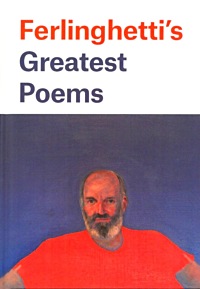 Through this tight lens, it is now possible to see Ferlinghetti—a brilliant and prolific poet—in a richer, broader, and more complex way. From his very first landmark books—Pictures of the Gone World (City Lights, 1955) and A Coney Island of the Mind (New Directions, 1958)—to new work, Ferlinghetti’s Greatest Poems displays every stage of this multifaceted writer’s long and celebrated career. It’s exciting to revisit in one slender volume so much of the splendid, playful, and trenchant work of one of America’s greatest and most popular poets.
Through this tight lens, it is now possible to see Ferlinghetti—a brilliant and prolific poet—in a richer, broader, and more complex way. From his very first landmark books—Pictures of the Gone World (City Lights, 1955) and A Coney Island of the Mind (New Directions, 1958)—to new work, Ferlinghetti’s Greatest Poems displays every stage of this multifaceted writer’s long and celebrated career. It’s exciting to revisit in one slender volume so much of the splendid, playful, and trenchant work of one of America’s greatest and most popular poets.
“A brave man and a brave poet.”––Bob Dylan
Lawrence Ferlinghetti, poet and founder of City Lights Books, author of A Coney Island of the Mind and Pictures of the Gone World, among numerous other books, has been drawing from life since his student days in Paris where he frequented the Academie Julien and where he did his first oil painting.
“Lawrence gets you laughing and then hits you with the truth.”––Francis Ford Coppola
Title: Ferlinghetti’s Greatest Poems
Author: Lawrence Ferlinghetti
Edited by Nancy J. Peters
Publisher New Directions Publishing Corporation
Format Hardcover, $16.95
144 pp.
ISBN-10 081122712X
ISBN-13 9780811227124
Publication Date 21 November 2017
new poetry books
fleursdumal.nl magazine
More in: #Beat Generation Archives, - Book News, - Bookstores, Archive E-F, Archive E-F, Art & Literature News
Angst beheerst zijn nachten. Nachtmerries. Vreemde dromen die voortduren als hij wakker is. Waarom komen er steeds van die krankzinnige verhalen in hem op? Het plafond als een allesverzwelgende zee. Maar ook al is hij helemaal wakker, toch kan hij het rare verhaal over verdrinkende steden en dorpen en de later opnieuw verdampende zee niet van zich afzetten.
 Als kind al beleefde hij van die wonderlijke verhalen. Vaak was hij een reus. De sterkste. Om zichzelf te bewijzen. Omdat hij groter en sterker wilde zijn dan Tijger, die meestal vlugger en gehaaider was. Sterker willen zijn was lijfsbehoud.
Als kind al beleefde hij van die wonderlijke verhalen. Vaak was hij een reus. De sterkste. Om zichzelf te bewijzen. Omdat hij groter en sterker wilde zijn dan Tijger, die meestal vlugger en gehaaider was. Sterker willen zijn was lijfsbehoud.
Het is iets in zijn hoofd. Zijn hele leven al komen er de vreemdste dingen in hem op. Zijn fantasieën brengen hem overal, maar zelden naar hier, naar dit vertrek, waar hij altijd alleen is.
Hij vouwt zijn kussen dubbel, probeert overeind te komen om de kamer te overzien.
Het irriteert hem dat de deur van de slaapkamer openstaat. Hij slaapt altijd met de deur open, niet omdat hij dat wil, maar omdat Lizet te beroerd is om de deur dicht te doen. Ze zegt dat ze hem dan beter kan horen als er ‘s nachts iets mis is. Met die deur open is hij nooit helemaal alleen. In huis hoort hij alles, ‘s nachts zelfs het druppelen van de kraan in de keuken. Tot hij er gek van wordt.
Het is pas half acht. Hij moet nodig plassen, maar hij moet nog een half uur geduld hebben, voordat Lizet hem uit bed haalt en hem naar het toilet brengt: het aangepaste toilet met hoge pot en handgrepen, ingebouwd in de kleine badcel die in een hoek van zijn slaapkamer is gemaakt. In geval van hoge nood kan hij in de fles plassen, maar dat doet hij liever niet. Lizet vindt het niet prettig om de fles schoon te maken. Dat ziet hij aan haar gezicht, die enkele keer dat het niet anders kan. Het gebeurt soms, als hij voor het slapen gaan bier heeft gedronken. Hij heeft geen zin in toestanden. Ruzie moet hij voorkomen. Dan maar geen bier.
Eindelijk rinkelt de wekker. Acht uur. Hij zet hem af. Direct daarna klinkt het hoge rammelen van de wekker op Lizets kamer. Haar dansende wekker staat in een soepbord vol muntjes. Even later hoort hij haar uit haar kamer komen. Haar sloffende stappen op de overloop. Hij sluit zijn ogen.
`Waarom word je altijd schreeuwend wakker?’ zegt ze, de kamer binnenkomend.
Hij kan nu niet meer doen of hij slaapt en opent zijn ogen opnieuw. In haar kamerjas staat ze naast zijn bed.
`Ik heb vreselijk gedroomd.’
`Je hebt een slecht geweten.’
Hij zegt er maar niets op. Hij zou gaan schreeuwen. Nooit vertelt hij haar iets over zijn dromen. Lizet ergert zich nog steeds aan Thija. Hij weet het. Eén keer, een paar jaar geleden, heeft hij verteld van het vliegtuig dat tegen de silo vloog. Hij vertelde het toen aan zijn kleindochter. Afke was een jaar of tien. Hij was pas een paar maanden thuis uit het revalidatiecentrum. Lizet had het toevallig gehoord. Ze had hem uitgelachen. Ze vond zijn droom belachelijk, de droom van een kind. Misschien, maar dat had ze waarschijnlijk niet durven zeggen, had ze gedacht dat hij na dat ongeluk weer een kind was geworden. Dat ze hem als een kind thuis had gekregen. Een lastig kind, dat kort gehouden moest worden en dat zelf niet mocht bepalen wanneer het uit bed werd gehaald en verzorgd.
Lizet loopt naar het toilet. Zoals gewoonlijk vergeet ze de deur achter zich te sluiten. Sinds de badcel met toilet op zijn kamer is, gebruikt zij het ook, en daarom haat hij het. Hij hoort de straal tegen de pot. Het maakt hem razend. `Waarom sluit je de deur niet!’ wil hij roepen, maar hij roept niet. Ze is hem de baas.
Haar ochtendjas goed trekkend, komt ze naar buiten. Ze drukt op de knop om het hoofdeinde van zijn bed recht te zetten, slaat de deken terug, tilt zijn benen uit bed en schuift hem in één beweging in de rolstoel.
`Tandenpoetsen.’
`Eerst naar het toilet. Ik moet nodig.’
`Vandaag wil je eerst dit, morgen wil je eerst dat.’ Haar stem is hoog van ergernis.
Ze rolt hem naar het toilet. Hij kan zelf uit de rolstoel op de pot schuiven. Omdat hij zijn armen sterk houdt. Het zou een te grote vernedering voor hem zijn om ook nog door haar op de pot te worden gezet. Of zal hij als het zover komt, om te overleven, weer opnieuw zijn grens verleggen? Eerder had hij het plan er een eind aan te maken als hij zichzelf niet meer kon aankleden. Maar toen het zover was, had hij uitvluchten gezocht om toch te blijven leven. Om voor iemand te leven. Gelukkig was Afke er. Voor haar verlegt hij zijn grens steeds verder naar beneden.
Afke herinnert hem aan Marjan als kind. Toen ze samen alles deden. Roeien op de Wijer. Door de bossen hollen en verstoppertje spelen. Jammer dat hij dat met Afke niet kan. Hij kan geen meter lopen. Hij kan nooit meer door de modder spatten. Nooit meer het zachte mos onder zijn blote voeten voelen. De spitse dennennaalden, het was fijn om bij het lopen pijn aan zijn voeten te voelen. Zijn lichaam wilde weten dat het op voeten gedragen werd. Dat hij juist zijn voeten moest verliezen! Als hij denkt aan de wandelingen door de bossen, voelt hij de pijn nog. Fantoompijn. De tinteling die door zijn hele lijf trok als de naalden in zijn voeten staken. Het deed hem goed.
Hij wacht op Lizet, die voor de spiegel wat aan haar haar doet. Eindelijk verlaat ze de badcel. Voorzichtig glijdt hij, de armen geklemd rond de dragers, op de pot en schuift de pyjamabroek over zijn benen.
Altijd draagt hij blauwe pyjama’s. Blauwe hemden. Blauwe broeken. Blauwe pakken. Als kind wilde hij het niet. Later wist hij niet beter meer. Aan hem bleef alles blauw. De kleur van water. Van de Wijer. Hij kan niet meer leven zonder blauw.
Ton van Reen: Het diepste blauw (026)
wordt vervolgd
fleursdumal.nl magazine
More in: - Book Stories, - Het diepste blauw, Archive Q-R, Reen, Ton van
A look back at the cultural and political force of Pulitzer Prize–winning poet Gwendolyn Brooks, in celebration of her hundredth birthday
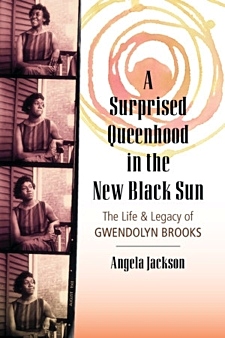 Pulitzer-Prize winning poet Gwendolyn Brooks is one of the great American literary icons of the twentieth century, a protégé of Langston Hughes and mentor to a generation of poets, including Sonia Sanchez, Nikki Giovanni, and Elizabeth Alexander.
Pulitzer-Prize winning poet Gwendolyn Brooks is one of the great American literary icons of the twentieth century, a protégé of Langston Hughes and mentor to a generation of poets, including Sonia Sanchez, Nikki Giovanni, and Elizabeth Alexander.
Her poetry took inspiration from the complex portraits of black American life she observed growing up on Chicago’s Southside—a world of kitchenette apartments and vibrant streets. From the desk in her bedroom, as a child she filled countless notebooks with poetry, encouraged by the likes of Hughes and affirmed by Richard Wright, who called her work “raw and real.”
Over the next sixty years, Brooks’s poetry served as witness to the stark realities of urban life: the evils of lynching, the murders of Emmett Till and Malcolm X, the revolutionary effects of the civil rights movement, and the burgeoning power of the Black Arts Movement. Critical acclaim and the distinction in 1950 as the first black person ever awarded a Pulitzer Prize helped solidify Brooks as a unique and powerful voice.
 Now, in A Surprised Queenhood in the New Black Sun, fellow Chicagoan and award-winning writer Angela Jackson delves deep into the rich fabric of Brooks’s work and world. Granted unprecedented access to Brooks’s family, personal papers, and writing community, Jackson traces the literary arc of this artist’s long career and gives context for the world in which Brooks wrote and published her work. It is a powerfully intimate look at a once-in-a-lifetime talent up close, using forty-three of Brooks’s most soul-stirring poems as a guide.
Now, in A Surprised Queenhood in the New Black Sun, fellow Chicagoan and award-winning writer Angela Jackson delves deep into the rich fabric of Brooks’s work and world. Granted unprecedented access to Brooks’s family, personal papers, and writing community, Jackson traces the literary arc of this artist’s long career and gives context for the world in which Brooks wrote and published her work. It is a powerfully intimate look at a once-in-a-lifetime talent up close, using forty-three of Brooks’s most soul-stirring poems as a guide.
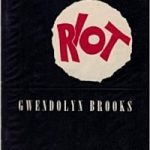 From trying to fit in at school (“Forgive and Forget”), to loving her physical self (“To Those of My Sisters Who Kept Their Naturals”), to marriage and motherhood (“Maud Martha”), to young men on her block (“We Real Cool”), to breaking history (“Medgar Evers”), to newfound acceptance from her community and her elevation to a “surprising queenhood” (“The Wall”), Brooks lived life through her work.
From trying to fit in at school (“Forgive and Forget”), to loving her physical self (“To Those of My Sisters Who Kept Their Naturals”), to marriage and motherhood (“Maud Martha”), to young men on her block (“We Real Cool”), to breaking history (“Medgar Evers”), to newfound acceptance from her community and her elevation to a “surprising queenhood” (“The Wall”), Brooks lived life through her work.
Jackson deftly unpacks it all for both longtime admirers of Brooks and newcomers curious about her interior life. A Surprised Queenhood in the New Black Sun is a commemoration of a writer who negotiated black womanhood and incomparable brilliance with a changing, restless world—an artistic maverick way ahead of her time.
What shall I give my children? who are poor,
Who are adjudged the leastwise of the land,
Who are my sweetest lepers, who demand
No velvet and no velvety velour;
But who have begged me for a brisk contour,
Crying that they are quasi, contraband
Because unfinished, graven by a hand
Less than angelic, admirable or sure.
from ‘The Children of the Poor’
Angela Jackson is an award-winning poet, playwright, and novelist. She is the author of numerous collections of poetry, including the National Book Award–nominated And All These Roads Be Luminous: Poems Selected and New. Her novel Where I Must Go won the American Book Award in 2009. Its sequel, Roads, Where There Are No Roads, was published in 2017. Additionally, Jackson was longlisted for the Pulitzer Prize and a longlist finalist for the PEN Open Book Award for her 2015 poetry collection, It Seems Like a Mighty Long Time. Other honors include a Pushcart Prize, Academy of American Poets Prize, TriQuarterly’s Daniel Curley Award, and the Poetry Society of America’s Shelley Memorial Award. Jackson lives in Chicago.
A Surprised Queenhood in the New Black Sun
The Life & Legacy of Gwendolyn Brooks
By Angela Jackson
Paperback – $18.00
ISBN 9780807059128
Published by Beacon Press
208 Pages
May 29, 2018
new books
fleursdumal.nl magazine
More in: - Book News, Archive A-B, Archive A-B, Archive I-J, Archive I-J, BIOGRAPHY, REPRESSION OF WRITERS, JOURNALISTS & ARTISTS
Rainer Maria Rilke feierte die Liebe, verschrieb sich ihr mit ganzer Seele. Die Frauen standen für ihn im Mittelpunkt.
 Angefangen bei seiner innig geliebten Mutter Sophia und der gestrengen »Übermutter« Lou Andreas-Salomé über die Bildhauerin Clara Westhoff bis zu der großzügigen Mäzenin Fürstin von Thurn und Taxis. In seiner neuen, meisterlich geschriebenen Biografie erzählt Heimo Schwilk von diesen Frauen und ihren Schicksalen.
Angefangen bei seiner innig geliebten Mutter Sophia und der gestrengen »Übermutter« Lou Andreas-Salomé über die Bildhauerin Clara Westhoff bis zu der großzügigen Mäzenin Fürstin von Thurn und Taxis. In seiner neuen, meisterlich geschriebenen Biografie erzählt Heimo Schwilk von diesen Frauen und ihren Schicksalen.
Ein Buch über die Liebe – und wie sie sich in großer Dichtung vollendet.
Heimo Schwilk, geboren 1952 in Stuttgart, Dr. phil., ist Autor zahlreicher Bücher über Politik und Literatur. Seine großen Biografien über Ernst Jünger und Hermann Hesse wurden im In- und Ausland hoch gelobt. Er war lange Jahre Leitender Redakteur der Welt am Sonntag und lebt in Berlin. 1991 wurde er mit dem Theodor-Wolff-Preis für herausragenden Journalismus ausgezeichnet.
Heimo Schwilk
Rilke und die Frauen
Biografie eines Liebenden
‘Piper’ Taschenbuch
Piper Verlag GmbH
Mit 22 Abbildungen
EAN: 9783492308878
ISBN: 3492308872
2016
336 Seiten
kartoniert
€ 11,00
new books
fleursdumal.nl magazine
More in: - Book News, Archive Q-R, Archive Q-R, Archive S-T, Art & Literature News, Rilke, Rainer Maria, The Ideal Woman
Gathered on the occasion of Robert Lowell’s one hundredth birthday, New Selected Poems offers a fresh and illuminating representation of one of the great careers in twentieth-century poetry.
 The renowned and controversial author of many books of poems, plays, and translations, Lowell was one of the United States’ most honoured poets, winning the Pulitzer Prize in Poetry in 1947 and 1974, the National Book Award, and the National Book Critics Circle Award.
The renowned and controversial author of many books of poems, plays, and translations, Lowell was one of the United States’ most honoured poets, winning the Pulitzer Prize in Poetry in 1947 and 1974, the National Book Award, and the National Book Critics Circle Award.
His ongoing interrogation of his family legacy, his personal struggle with manic depression, and his mastery of the tradition of poetry in English formed the groundbreaking autobiographical foundation of Life Studies (1959) and the books that followed it, including For the Union Dead (1964), Near the Ocean (1967), History (1973), and Day by Day (1977).
Katie Peterson’s incisive selection of Lowell’s poems draws attention to ‘the perishability of life, its twinned quality of fragility and repetition, as framed by the structured evanescence of daily consciousness.’ Lowell’s own intense dramas and struggles are the substrate he drew on in his restless search to make sense of, and fix, shape-shifting experience – not his, but ours. As Peterson says, Lowell was ‘constitutionally immune to any stultifying permanence either of form or of spirit.’ Her brilliant new reading of Lowell shows us his work constantly breaking, renewing, transforming, as he strives restlessly, over and over, to find an elusive unity.
Robert Lowell (1917-1977) was born in Boston. He was recognised as an accomplished poet in his own lifetime, and along with Elizabeth Bishop, John Berryman and Sylvia Plath he created the fashion and generated the force of American poetry over the 1950s, 60s, and 70s. Life Studies, published in 1959, marked a watershed. It initiated an autobiographical project which would dominate his oeuvre thereafter, and is now regarded as one of the most influential books of the century. He received a Pulitzer Prize for Lord Weary’s Castle (1946) and another for The Dolphin (1973).
New Selected Poems
by Robert Lowell (Author),
Katie Peterson (Editor)
ISBN 9780571339488
Format Paperback
Published 03/08/2017
Length 272 pages
£14.99
Publisher: Farrar, Straus and Giroux
Language: English
ISBN-10: 0374251339
ISBN-13: 978-0374251338
new poetry books
fleursdumal.nl magazine
More in: - Book News, Archive K-L, Archive K-L, Art & Literature News, Robert Lowell
Thank you for reading Fleurs du Mal - magazine for art & literature